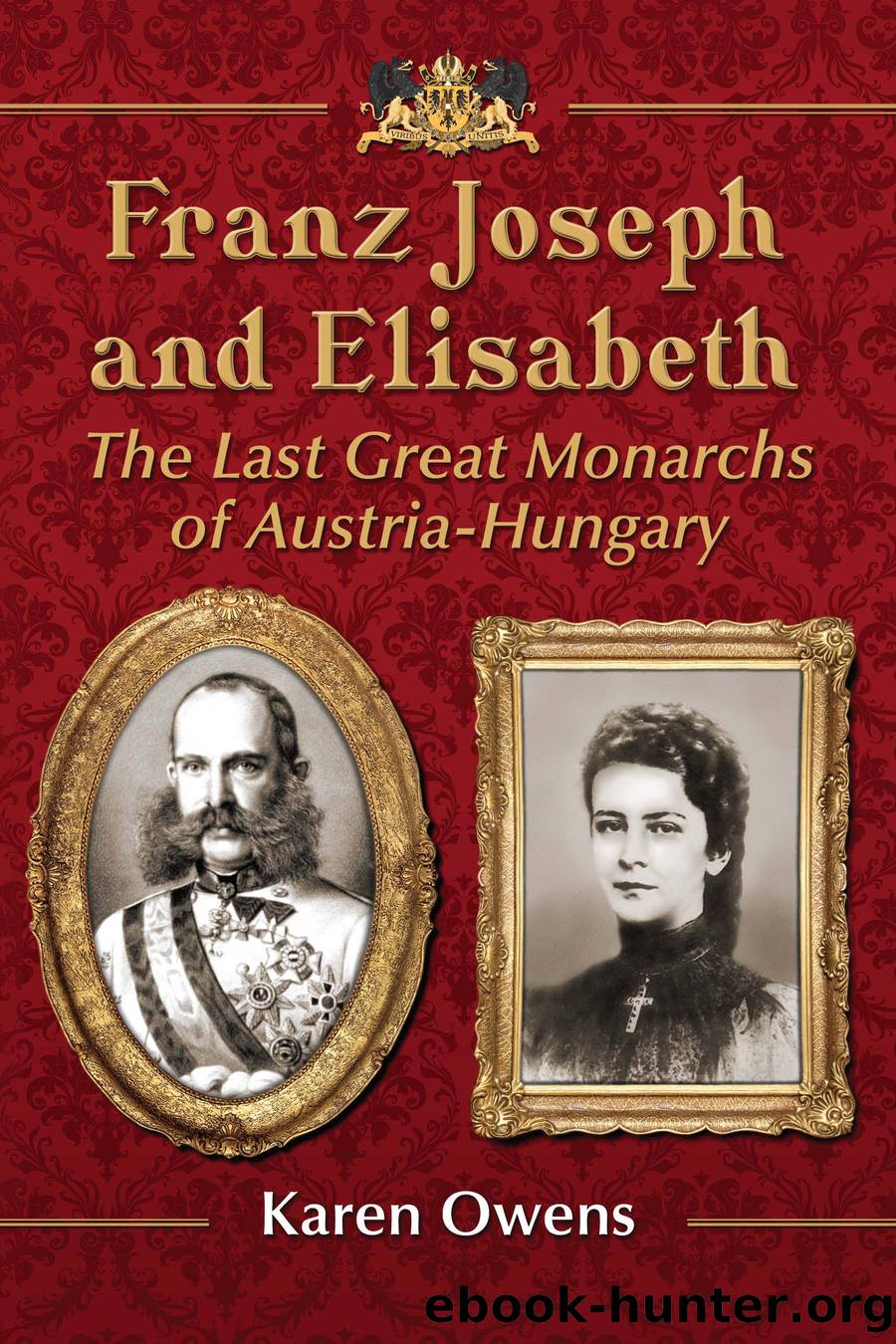Franz Joseph and Elisabeth by Karen Owens

Author:Karen Owens
Language: eng
Format: epub
Publisher: McFarland & Company, Inc., Publishers
Published: 2013-11-06T00:00:00+00:00
and it by no means follows that this need be at the time of physical death.50
CHAPTER SEVEN
The Royal Mistress
After Mayerling, the succession order to the throne changed. The next heir to the throne should, in fact, have been the emperorâs fifty-five-year-old brother Archduke Karl Ludwig. But Karl had not taken an active part in Austrian politics and he was quite as devoid of ambition as his own father had been. It was widely assumed that he, like his father before him, would relinquish the throne to his son Franz Ferdinand. But, shortly after the death of the crown prince, his father died from typhoid contracted on his pilgrimage to the Holy Land. Franz Ferdinand now held the coveted position of heir to the Habsburg empire. Most Austrians knew very little about Franz Ferdinand and, thus, his elevated position did not excite any expectant hopes for a better constitutional future under his reign.
Princess Maria Annunciata of Boubon-Two Sicilies gave birth to her first born, a son named Franz Ferdinand, in Graz in 1863. As a young boy, Franz Ferdinand suffered from tuberculosis, which, in most cases, was a death sentence. He inherited the disease from his mother, who subsequently died when Franz Ferdinand was just nine years old. Because of this illness, it was generally believed that there was little or no chance that Franz Ferdinand would become heir to the throne. Even though he was known to be oppressed by his illness, with grim determination he soon let it be known that he was not prepared to renounce the throne. Partly to cure his lung ailment and partly to enlarge his knowledge, Franz Ferdinand went on several cruises, one of which took him around the world. When he returned from this long journey, in spring of 1889, his doctors declared him cured of the last of his several tubercular relapses. As an embodiment of vigor and health, he then hastened to assert his rights to the succession. He often saw his cure as a sign that he would become emperor. And now after Mayerling, this came to pass.
It was almost a rite of passage for Habsburg males to join the army. Thus, Franz Ferdinand joined the Austro-Hungarian Army in 1883, serving in Hungary, Upper Austria, and Bohemia. His military career included service with an infantry regiment in Prague and with the hussars in Hungary. While in the army Ferdinand received several rather quick promotions: captain (1885), major (1888), colonel (1890) and general (1896). His genealogy was impeccable; unfortunately, his character did not match his royal family pedigree. He was not an especially cultured man; at times, he was prideful and mistrusting. He simply lacked the charisma to make him socially and politically popular.1 He had a strong tendency towards political intrigue, and an innate dislike for everything antiâCatholic. His religious beliefs were fervent and he observed all the externals of religion very scrupulously from his childhood. Franz Ferdinand had a long-standing contempt for Viennese high society. He was opposed to all the liberal ideas, and he was fiercely opposed to republican and antiâCatholic France as well.
Download
This site does not store any files on its server. We only index and link to content provided by other sites. Please contact the content providers to delete copyright contents if any and email us, we'll remove relevant links or contents immediately.
Waking Up in Heaven: A True Story of Brokenness, Heaven, and Life Again by McVea Crystal & Tresniowski Alex(37809)
Empire of the Sikhs by Patwant Singh(23085)
We're Going to Need More Wine by Gabrielle Union(19046)
Hans Sturm: A Soldier's Odyssey on the Eastern Front by Gordon Williamson(18590)
Leonardo da Vinci by Walter Isaacson(13336)
The Radium Girls by Kate Moore(12028)
Tools of Titans by Timothy Ferriss(8395)
Educated by Tara Westover(8054)
How to Be a Bawse: A Guide to Conquering Life by Lilly Singh(7486)
Permanent Record by Edward Snowden(5847)
The Last Black Unicorn by Tiffany Haddish(5635)
The Rise and Fall of Senator Joe McCarthy by James Cross Giblin(5280)
Promise Me, Dad by Joe Biden(5153)
The Wind in My Hair by Masih Alinejad(5095)
A Higher Loyalty: Truth, Lies, and Leadership by James Comey(4963)
The Crown by Robert Lacey(4815)
The Iron Duke by The Iron Duke(4354)
Joan of Arc by Mary Gordon(4110)
Stalin by Stephen Kotkin(3965)
